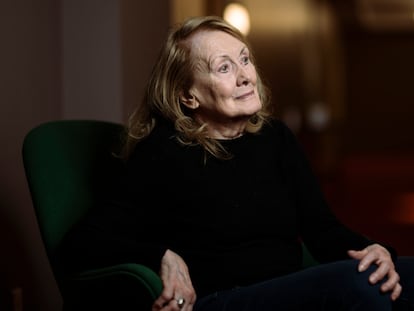Annie Ernaux wins the 2022 Nobel Prize in Literature
The Swedish Academy rewarded the French writer’s ‘courage and clinical acuity with which she uncovers the roots, estrangements and collective restraints of personal memory’

The French writer Annie Ernaux, 82, has won the 2022 Nobel Prize in Literature. The award, granted by the Swedish Academy, also comes with a cash prize of 10 million Swedish krona (around $911,000) and will be handed out in December.
“I consider it a great honor and at the same time a great responsibility, a responsibility that has been handed me along with the prize. That is, to manifest a form of fairness, of justice, in connection with the world,” Ernaux told Swedish television station SVT in her first statements after learning the news.
Ernaux was selected because of the “courage and clinical acuity with which she uncovers the roots, estrangements and collective restraints of personal memory,” said the academy in a statement. This reasoning could almost come from the mouth of Ernaux herself, who believes that literature should work “like a knife.” The author writes with a scalpel in her hand, always ready to reach the bone, to get “to the bottom of a certain truth.”
Her autobiographical work, painstakingly created over the last five decades, lies somewhere between narrative and the human sciences, at a spot where history and sociology count as much as individual memory. Ernaux is convinced that it is impossible to dissociate the two.
For Ernaux, the first person is an empty container used to collect a widely shared experience. “The self is only a place and not the expression of a person,” she said in an interview with EL PAÍS in 2019 at her home in Cergy-Pontoise, about 40 kilometers from Paris, one of those new suburbs that Pompidou built from scratch to alleviate urban pressure on the capital. It is a place without history, a peculiar choice for a writer obsessed with memory, where Ernaux lives alone, in a small house with a garden decorated in the British style and located in a somewhat isolated residential area. “I know it sounds like a contradiction, but this city without a past was the only place where I felt at home. Historic cities remind me of a long tradition of social exclusion. Here I could live without feeling subjected to that determinism,” Ernaux explained, influenced as always by the theories of the sociologist Pierre Bourdieu.
Ernaux is the 17th woman to win the highest international literary distinction and the fifth in the last 10 years. Although the most awarded language is English, France is the country that has received the accolade on the most occasions: 15 times in total, including Jean-Paul Sartre’s 1964 award, although he chose not to accept it.
Tu suscripción se está usando en otro dispositivo
¿Quieres añadir otro usuario a tu suscripción?
Si continúas leyendo en este dispositivo, no se podrá leer en el otro.
FlechaTu suscripción se está usando en otro dispositivo y solo puedes acceder a EL PAÍS desde un dispositivo a la vez.
Si quieres compartir tu cuenta, cambia tu suscripción a la modalidad Premium, así podrás añadir otro usuario. Cada uno accederá con su propia cuenta de email, lo que os permitirá personalizar vuestra experiencia en EL PAÍS.
¿Tienes una suscripción de empresa? Accede aquí para contratar más cuentas.
En el caso de no saber quién está usando tu cuenta, te recomendamos cambiar tu contraseña aquí.
Si decides continuar compartiendo tu cuenta, este mensaje se mostrará en tu dispositivo y en el de la otra persona que está usando tu cuenta de forma indefinida, afectando a tu experiencia de lectura. Puedes consultar aquí los términos y condiciones de la suscripción digital.








































